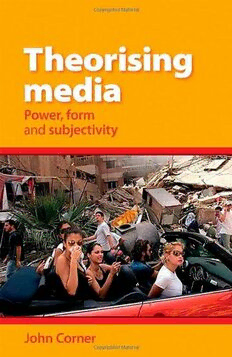Table Of Content00c_Theorising Media_i-viii 28/3/11 13:38 Page i
THEORISING MEDIA
00c_Theorising Media_i-viii 28/3/11 13:38 Page ii
00c_Theorising Media_i-viii 28/3/11 13:38 Page iii
T
HEORISING MEDIA
Power, form and subjectivity
John Corner
Manchester University Press
Manchester and New York
DistributedintheUnitedStatesexclusively
byPalgraveMacmillan
00c_Theorising Media_i-viii 28/3/11 13:38 Page iv
Copyright©JohnCorner2011
TherightofJohnCornertobeidentifiedastheauthorofthisworkhasbeenassertedby
himinaccordancewiththeCopyright,DesignsandPatentsAct1988.
PublishedbyManchesterUniversityPress
OxfordRoad,ManchesterM139NR,UK
andRoom400,175FifthAvenue,NewYork,NY10010,USA
www.manchesteruniversitypress.co.uk
DistributedintheUnitedStatesexclusivelyby
PalgraveMacmillan,175FifthAvenue,NewYork,
NY10010,USA
DistributedinCanadaexclusivelyby
UBCPress,UniversityofBritishColumbia,2029WestMall,
Vancouver,BC,CanadaV6T1Z2
BritishLibraryCataloguing-in-PublicationData
AcataloguerecordforthisbookisavailablefromtheBritishLibrary
LibraryofCongressCataloging-in-PublicationDataappliedfor
ISBN 9780719082603 hardback
Firstpublished2011
ThepublisherhasnoresponsibilityforthepersistenceoraccuracyofURLsforany
externalorthird-partyinternetwebsitesreferredtointhisbook,anddoesnotguarantee
thatanycontentonsuchwebsitesis,orwillremain,accurateorappropriate.
Typeset
by4wordLtd,Bristol,UK
PrintedinGreatBritain
byTJInternationalLtd,Padstow
00c_Theorising Media_i-viii 28/3/11 13:38 Page v
For Denise
00c_Theorising Media_i-viii 28/3/11 13:38 Page vi
00c_Theorising Media_i-viii 28/3/11 13:38 Page vii
Contents
Acknowledgements page viii
Introduction 1
Part I
1 Power 13
2 Form 49
3 Subjectivity 86
Part II(1): Terms of analysis
4 Mediated politics, promotional culture and the idea
of ‘propaganda’ 122
5 ‘Ideology’: a note on conceptual salvage 139
6 Public knowledge and popular culture: spaces and tensions 152
Part II(2): Visuality and documentation
7 Documentary expression and the physicality of the
referent: writing, painting and photography 167
8 Documenting the political: some issues 187
9 ‘Critical social optics’ and the transformations of
audio-visual culture 209
References 222
Index 235
00c_Theorising Media_i-viii 28/3/11 13:38 Page viii
Acknowledgements
The chapters in Part I are new work, although a section of Chapter 3
draws on and develops material which first appeared in the commentary
piece, ‘Debating Culture’ in Media, Culture and Society, 16.1 1994, 141–8.
The Items in Part II have been previously published, sometimes in dif-
ferent versions, as follows: Chapters 4, 5 and 6 in Media, Culture and
Society, 29.4 (2007); 23.4 (2001) and 31.1 (2009) respectively; Chapters 7
and8inStudiesinDocumentary Film 1.1(2007)and3.2(2009)respectively,
and Chapter 9 in Jostein Gripsrud (ed.) (2010) Relocating Television,
Routledge,41–54.I thankthe publishers,Sage.UK,IntellectBooksand
Routledge for permission to use the material in Part II.
I am grateful to the many refereesinvolved in providingadvice in devel-
opment of the draft material in Part II as well as the relevant editors,
including particularly Raymond Boyle, Deane William and Jostein
Gripsrud.
I also thank my colleagues at Liverpool University, particularly Kay
Richardson and Katy Parry, and at Leeds University, particularly
Stephen Coleman, David Hesmondhalgh and David Morrison, who
have influenced some of the ideas and the writing in Part I. I also want
to acknowledge the contribution made by Peter Dahlgren of Lund
University in direct comment on my writing, in broader conversational
exchanges and more generally in the richly suggestive example of his
work on many of the themes addressed in this volume.
01c_Theorising Media_001-234 1/4/11 08:47 Page 1
Introduction
‘Theorising’isusedinthisbooktoindicatetheactivityoftryingtoreach
adequate conceptual terms for understanding media structures and
processes. It is therefore rather different from, if necessarily related to,
the idea of ‘media theory’, the body of published explanations and
propositions about the media that has developed from different fields of
study. Both have their place in what follows, but primacy is given to the
former. Later in this introduction, I discuss definitional matters concern-
ing the ‘theoretical’ a little further.
Part I of this book explores three aspects or dimensions of media
structure and process that are central to any understanding of how the
media work. Part II consists of a number of more focused analytic com-
mentaries and case studies which both draw upon and contribute to
conceptual discussion and development regarding these aspects. Each of
the aspects is broad and rather loose in definition, but the identifying
terms themselves – power, form and subjectivity – are essential cate-
gories for enquiry, whatever the internal differentiations that are then
madewithinthemandthelinkagesandoverlapsidentifiedbothbetween
the three and across other categories and terms.
‘Power’ is of course the long-standing principal theme of media
research, sometimes employed directly, sometimes through ideas of
‘influence’ and of ‘effect’ and also of ‘policy’. Attempting to understand,
and perhaps to contest, the way in which the media are placed within
flows of political, social and cultural power, acting both to relay power
and as distinctive sources of power themselves, has been an aim of
most media research internationally and the main aim of a great
variety of enquiries. Changes both in political systems and media sys-
tems, including changes in economics, technology and conventions of
practice, have shifted the terms on which power questions need to be
asked, even though there are also important continuities with an older
agenda.

